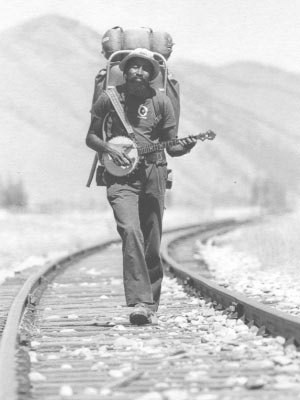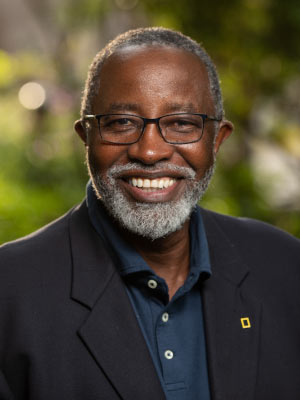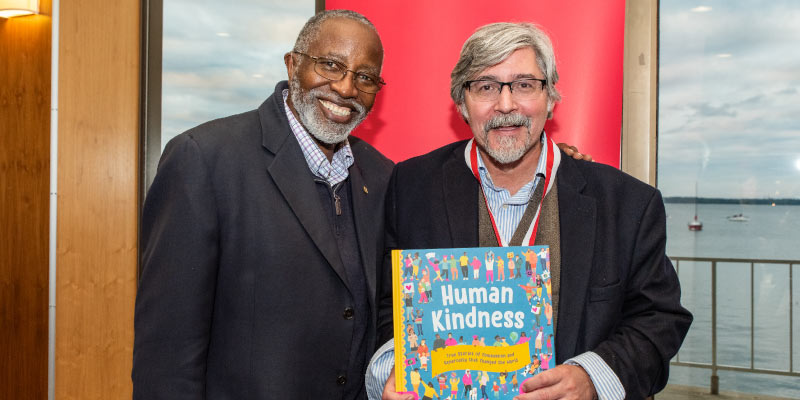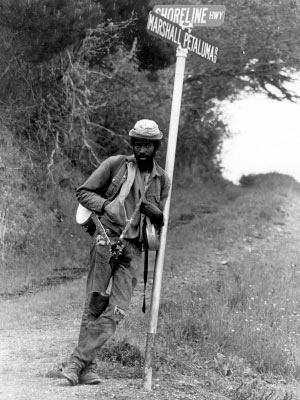
On January 18, 1971, two oil tankers, the Arizona Standard and the Oregon Standard, collided in the San Francisco Bay. The result was an 800,000-gallon oil spill that polluted the environment, decimated wildlife, and prompted John Francis, then 26-years-old, to make a change in his life. “When I went to visit the oil spill, I never actually saw it, but I could smell it. If you can imagine, an oil tanker with hundreds of thousands of gallons of oil just washing up on the beach,” Francis said. “It was horrific.”
“What I discovered from across the world, was that how we treated each other was how we treated the environment.”
— John Francis
To take a stand against the oil that caused such environmental devastation, Francis vowed to no longer use motor vehicles. That meant no cars, no buses, and no airplanes. He could have biked or used other forms of non-oil dependent forms of transportation, but Francis’ preferred method of getting around was walking, often averaging 20 miles per day.
His friends thought he was crazy. They figured that, eventually, Francis would stop walking everywhere. Francis thought the opposite — that others would start walking with him. Both were wrong, and for over two decades, Francis walked everywhere he needed to go. “My friends would drive by and wave,” Francis said. “They would stop to talk to me and ask if I wanted a ride, but after a while, they realized that I didn’t.”
During this time, Francis was working as a volunteer fireman — but he couldn’t quickly respond to fires on foot. He moved to dispatch. Little did he know that he would soon be adding a vow of silence to his ban against motor vehicles. “Not speaking became a way for me to break a habit of making nonsense up and saying things that really weren’t true to aggrandize myself in other people’s minds,” Francis said.

At first, Francis had only planned on not speaking for a day. A day turned into a year as he enjoyed just listening to others and not feeling compelled to speak back. Every birthday, Francis reassessed his decision, and ultimately, his vow lasted 17 years. Today, Francis meditates to start his day, taking in the silence of the morning. Sometimes, it carries through the whole day. “I try to warn my family, but usually they just figure it out,” Francis chuckled.
During his silent, walking-only era, Francis completed his undergraduate degree at Southern Oregon University (~350 miles), his master’s degree at the University of Montana (~800 miles), and his PhD in land resources at the Nelson Institute for Environmental Studies (~1,400 miles). To travel these long distances, Francis would set out months — sometimes years — in advance, stopping occasionally to play music on his banjo or pick up odd jobs. “Things happened along the way that made walking the most wonderful adventure,” he said. “I can’t imagine not having done that and missing that part of my life on the planet.”
Walking shoes are typically up for replacement every 500 miles, which meant Francis would have needed a new pair of shoes almost every month. As he had little money at the time and size 13 feet, that wasn’t an option. “We had a free box in town, and I would get whatever shoes I could find, but they didn’t always fit. My feet suffered terribly because I walked so much,” Francis said. Eventually, after Francis gained some recognition, the shoe company Timberland® sponsored him, providing new shoes whenever he needed them, but he still had to carry extra soles with him for repairs.
After making the over 1,400-mile trek to Wisconsin to begin his PhD, Francis met with all his professors to ensure them that he took his vows seriously. “I had to assure them that this wasn’t a joke — that I wasn’t trying to get out of work because I didn’t speak,” Francis said. “Actually, the ability to listen not only to my professors but [also] to my colleagues in school was phenomenal for my education in environmental studies.”

After completing his degrees, Francis walked to Washington, D.C. (~850 miles), where he joined the United States Coast Guard to aid in their response to the Exxon Valdez disaster in Alaska and contributed to drafting legislation for the Oil Pollution Act of 1990. In 1991, he was appointed United Nations Environmental Program Goodwill Ambassador to the World’s Grassroots Communities. Francis also founded Planetwalk, a nonprofit environmental awareness organization, to spread international friendship and raise environmental consciousness through newsletters, films, and other publications.

In 1994, Francis sailed through the Caribbean to begin a walk along the length of South America to continue his pilgrimage across the world. But as he walked through Venezuela, he had a realization: his vow against motor vehicles had become somewhat of a prison, rather than a living, breathing decision. So, Francis hopped a plane home to visit his parents. “They were freaked out, but overjoyed because they thought they would never see me again,” Francis said. “I believed that I owed the people who helped me get to this place something more. So, I used motorized vehicles to do work and to get back to where I left off so I could continue walking.”
Francis got married and in 2011 returned to Wisconsin, where he served as a visiting associate professor at the University of Wisconsin–Madison. Among his many accomplishments, Francis has written multiple books, was the first ever National Geographic Society Education Fellow, and continues to walk extraordinary distances in the name of environmental consciousness and kindness — most recently beginning a walk the length of Africa (~6,000 miles) at the age of 79 years old. “What I discovered from across the U.S. was that as I was treated with kindness, I flourished,” Francis said, reflecting on his time spent walking the planet that all started with an oil spill. “I understood that it’s really about kindness. If we are all a part of the environment then how we treat each other is how we treat the environment.”
 Go the Distance at Earth Fest
Go the Distance at Earth Fest
Planetwalker Screening
Tuesday, April 22 | 7–8:30 p.m.
Learn more and register